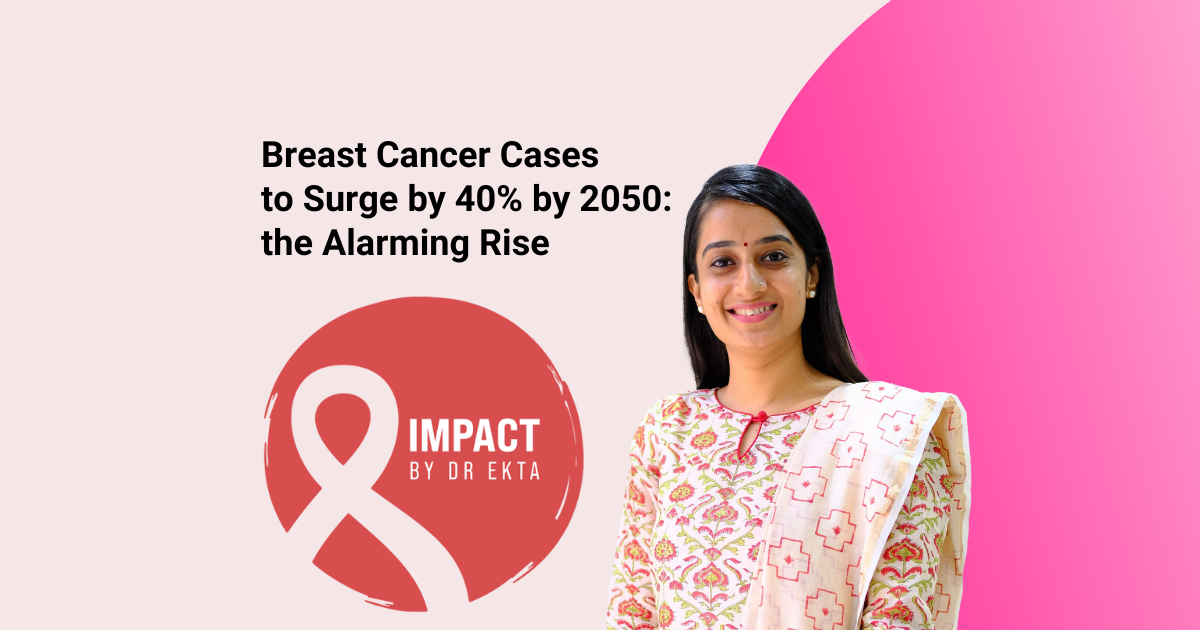According to the World Health Organization (WHO), breast cancer cases are expected to rise by a staggering 40% by the year 2050. This statistic is alarming and calls for immediate attention to the factors driving this surge and what we can do to prevent it.
Why Are Breast Cancer Cases Increasing?
There are multiple factors contributing to the rise in breast cancer cases worldwide. While some are linked to genetics, many are lifestyle-related and influenced by environmental and societal changes. Below are some of the key reasons behind the projected increase:
1. Aging Population
One of the primary reasons for the increase in breast cancer cases is the aging global population. As life expectancy rises, so does the risk of developing breast cancer, as age is a significant risk factor for the disease.
2. Lifestyle and Dietary Changes
Modern lifestyle habits, including poor diet choices, lack of physical activity, and obesity, have contributed to the increase in breast cancer cases. Diets high in processed foods, unhealthy fats, and sugar can lead to hormonal imbalances, which may trigger cancerous cell growth.
3. Hormonal and Reproductive Factors
Changes in reproductive health patterns, such as delayed childbirth, fewer pregnancies, and reduced breastfeeding rates, also contribute to the rise in breast cancer cases. These factors affect hormone levels, particularly estrogen, which plays a role in breast cancer development.
4. Environmental and Chemical Exposures
Exposure to endocrine-disrupting chemicals found in plastics, cosmetics, and certain food packaging materials may be increasing the risk of breast cancer cases. Pollutants and toxins in the air, water, and soil also contribute to the rising trend.
5. Genetic and Family History Factors
Although most breast cancer cases are not hereditary, individuals with a family history of breast cancer have a higher risk of developing the disease. Advances in genetic testing can help identify at-risk individuals, allowing for early monitoring and preventive measures.
The Global Impact of Rising Breast Cancer Cases
The increase in breast cancer cases will put immense pressure on healthcare systems worldwide. In many developing nations, where medical resources are already stretched thin, the surge in cases may lead to inadequate screening and late-stage diagnoses, which significantly reduce survival rates.
Strategies to Reduce Breast Cancer Risk
While we cannot completely eliminate the risk of breast cancer cases, there are several proactive steps individuals and governments can take to reduce the incidence of this disease.
1. Early Detection and Regular Screening
Routine mammograms and breast self-examinations are crucial in detecting cancer at an early stage. The earlier breast cancer cases are diagnosed, the better the chances of successful treatment and survival.
2. Maintaining a Healthy Lifestyle
- Eating a balanced diet rich in fruits, vegetables, and whole grains.
- Engaging in regular physical activity to maintain a healthy weight.
- Avoiding excessive alcohol consumption and quitting smoking.
These lifestyle changes significantly reduce the risk of breast cancer cases and improve overall well-being.
3. Education and Awareness Programs
Governments, healthcare organizations, and NGOs must invest in breast cancer awareness campaigns to educate the public on risk factors, screening methods, and preventive measures.
4. Improved Healthcare Access
Ensuring that all women, regardless of their socioeconomic status, have access to affordable breast cancer screening and treatment is crucial. The rise in breast cancer cases makes it imperative to expand healthcare infrastructure to meet the growing demand.
5. Advancements in Research and Treatment
Continued investment in cancer research is essential for discovering new treatment options and preventive strategies. Immunotherapy, targeted therapies, and advancements in precision medicine are promising developments that may help control breast cancer cases in the future.
Conclusion
The projection of a 40% increase in breast cancer cases by 2050 is a wake-up call for all of us. While medical advancements continue to improve survival rates, prevention remains our most powerful tool. By adopting healthier lifestyles, prioritizing early detection, and advocating for accessible healthcare, we can work together to combat this rising trend. My mission is to educate and empower individuals to take proactive steps in reducing their risk and ensuring a healthier future for generations to come.
Breast cancer is not just a medical issue; it is a societal concern that requires collective action. Let us spread awareness, encourage early screenings, and support research efforts to make a meaningful impact in the fight against breast cancer cases.

